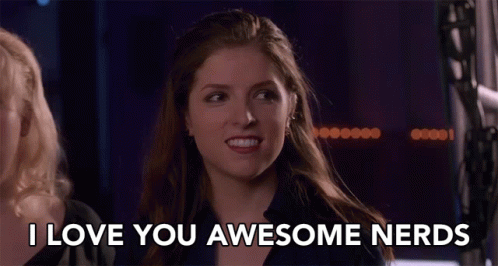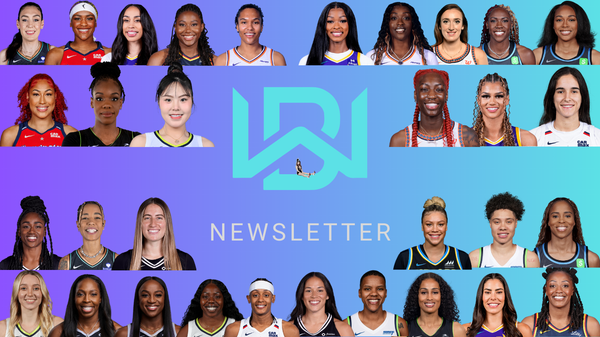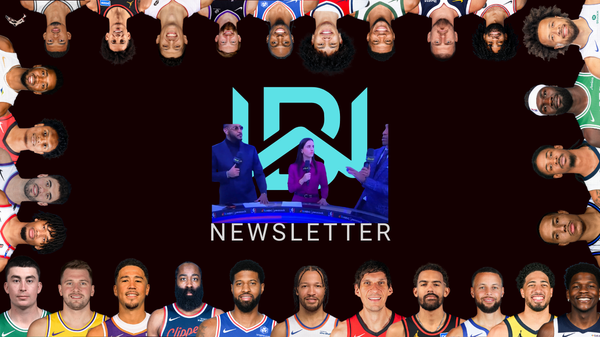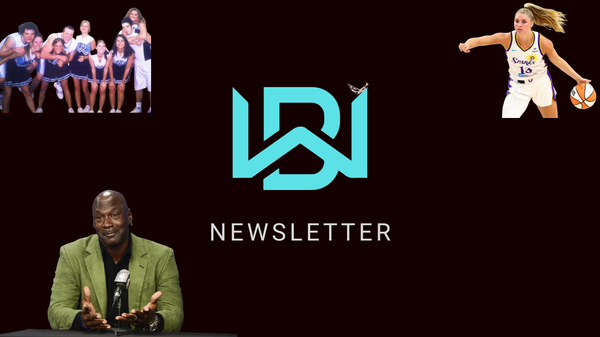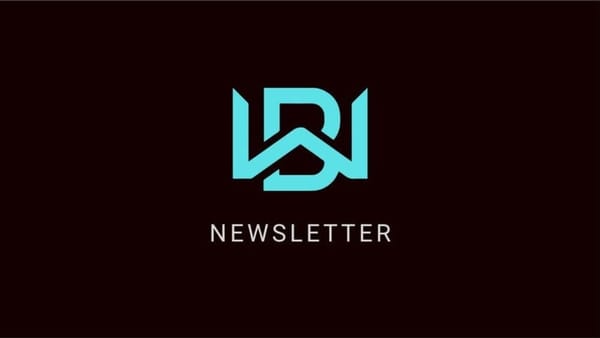A Conversation with Author Rachel Harrison
Bestselling author Rachel Harrison joins Walking Bucket today to discuss her new book "Play Nice," as well as the importance of horror, using it as an escape, her love of movies, and imposter syndrome.
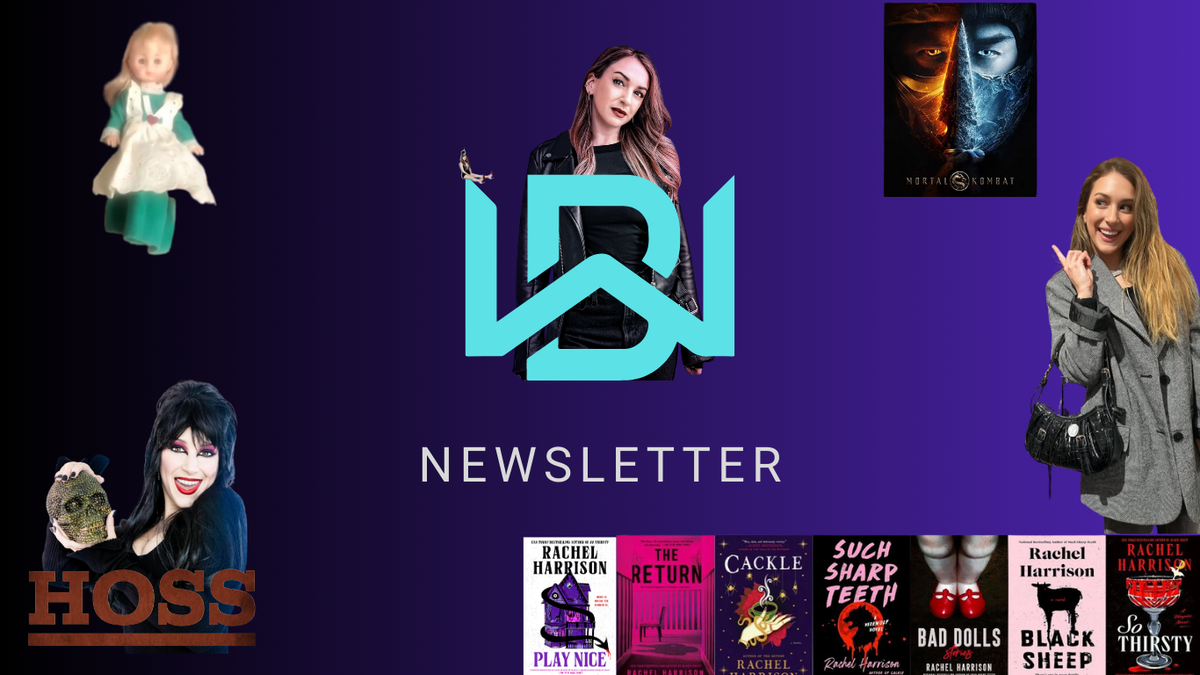
Rachel Harrison's new book, "Play Nice," is out September 9. She discusses what horror means to her, imposter syndrome, using horror as an escape, connecting through art, and more.
I've always liked reading, but I haven't always loved reading. I think that I lost a lot of that love from my childhood, when I was forced to read 50 pages of the Bible each night. And then, I would have a pop quiz on what I read. I had to get at least eight of the 10 answers right, or I would have to go read it again.
This was every single night that I lived with Bob and Francine Waterloo.
Thankfully, during the pandemic, I was able to turn to reading as an escape, and I found that love within the pages once again.
I was discovering new authors, new books, and new perspectives.
One of those authors that I found and came to enjoy was Rachel Harrison. Blayne is the horror person in our relationship – not me. But the great thing about Harrison's work is that she is able to make it so relatable, while still staying true to the genre.
There's a reason she is a USA Today Bestselling Author, and that her book, "Black Sheep," was named as the Best Horror Book in 2023 by the NY Times.
I was excited to chat with Harrison ahead of Independent Bookstore Day (April 26), not only about her new book, but also about movies, her disdain for the Kansas City Chiefs, imposter syndrome, using horror as an escape, and more during our nearly hour-long discussion.
I edited this interview for brevity and length (it's still super long), and since I'm the one-person show here, I'm OK with keeping the majority of the content in.
If you want to listen to the interview instead, the YouTube link is below.
Whatever you do, horror fan or not, check out what Harrison has to say, as it's super relatable in these times of suck.
Michael Waterloo: Welcome back to The Walking Bucket, and I'm joined by a special guest this week. She's the author of books such as 'Bad Dolls,' 'The Return,' 'Cackle,' 'Black Sheep,' 'Such Sharp Teeth,' 'So Thirsty,' and the forthcoming 'Play Nice,' available on Sept. 9., New Jersey fan, Yellowjackets fan, and Kansas City Chiefs … conspiracy theorist? …Rachel Harrison. Rachel, thank you for joining me.
Rachel Harrison: Yes! (Laughs) Thank you for having me.
MW: Yes, yes, absolutely, absolutely. We're going to get into the Kansas City Chiefs. I want to hear more about that.
But before we do, we have to talk about ‘Play Nice.’ Your new book is coming up right around the corner. I've seen some reviews out there that you've been sharing from people from advanced reader copies. What have they been like so far and how cool was that to see it in the wild?
RH: I think it's more anxiety inducing. Like I wish I could get to the point where I'd be excited, but I don't seek out reviews.
I had some like bookseller friends get early copies, and if they tag me in a review, I'll look at it because I'm only human, but it's kind of like, it's my people. So, I kind of know that it's going to be positive feedback, but it's been nice to immediately get that dopamine hit of, ‘Oh my gosh, they like it.’ But also, like immediately behind that is knowing that other people are reading it and being like, ‘I don't want to know,’ just covering my eyes and ears and just because once it's not yours anymore, like the book is done, if somebody doesn't like it, it's not like I can change it.
MW: One thing I admire about your books is the fresh spin and the relatable approach that you're able to kind of take to get people to relate to it. How important is it to you to make books that are within a genre like horror that people can relate to, whether it be with childhood trauma or such as ‘Black Sheep,’ where you kind of take things for what they are on the surface?
RH: We engage in art to feel less alone in the world. So, it's something I'm conscious of, but it's hard to predict relatability.
You kind of just have to be honest and vulnerable and authentic and just hope that people connect with it because like I could write an entire book about something that like happened to me and nobody could relate because we have this kind of ignorance of experience but it's very fulfilling too because all of my novels are contemporary to put something out there and have somebody be like ‘Oh my gosh like I've been through this so I relate to this I relate to this character’ because that's my hope going in but it's like it's unpredictable if it'll actually land.
MW: And looking forward to seeing that with ‘Play Nice,’ too. I just got done reading Grady Hendrix's ‘How to Sell a Haunted House.’ But with ‘Play Nice,’ we kind of know it's a little bit of a haunted house novel in a way. I know you can't give too much away, but what makes this book different from those in the past that we've seen within the genre.
RH: It feels like everything's been done before, like, there's nothing new under the sun. So, whenever I go into a novel, I'm not like, ‘I'm the first one like ever, like, plant my flag in a concept.’ (laughs)
But it's not really a haunted house novel. It's a possessed house novel. So, in the way that, like in a possession story, there's like a demon overtaking a body, it's like that, the demon lives in the house and is possessing the house. So instead of a ghost story, it's a possession story. And so, I think that's, I don't know if that's unique, but that was my take on it where I was. I could just do a classic haunted house book, or I can do like a demonic possession, but I kind of wanted to combine those two tropes and see where it took me.
MW: The first thing that stood out about the book to me was just the cover art. And if we can, I want to talk about that for a second, because as soon as I saw it, it became my favorite book cover of yours surpassing black sheep. I absolutely love it. I love pink. I love purple. I am who I am. I cannot help it. So, seeing that kind of just really stood out to me. How much creative say do you have in these when you're working with Katie Anderson or Andreea Dumuta?
RH: Katie has done all of my covers. She's done the art design, and Andrea did the illustration for this book and for 'So Thirsty.' They're extremely talented and it's been such a gift to work with Katie on all my covers because she just nails it every time.
Typically, the process for any author and covers is in the contracts, you get reasonable consultation, which means that like you don't have final say, but you can say at the beginning, your editor will come to you and say, what do you envision? Like, do you have ideas? And I'll usually send over some other covers that I like or like a picture collage. So, for this book, I think I saw it going either the way of a demon or a haunted house. I sent over some pictures, and then they came back with the illustration and the color palette, which I thought was perfect.
I shared the initial cover and then the sales team was like, ‘We love it, but we're a little bit worried that it looks too cute.’ And this book is very scary. So, we don't want to wrap like a ribbon around something traumatic and have people pick it up being like ‘cute,’ like not seeing the little demon in the house and then, you know, get to the scary parts and be like, what have I done? (laughs). So, sales came back and were like, ‘OK, we want to tweak the colors a little bit and change the tagline to just help readers understand what they're getting themselves into.'
MW: Yeah, they do a fantastic job. And yeah, I guess that makes sense so they're not baiting and switching them, like Drew Barrymore and Scream, and you're like 10 minutes in, you're like, ‘Wait, what? What just happened? She died?’ Yeah, that makes total sense.
And the book, of course, is coming out in September. It seems to be a theme that you're releasing a book every single fall, every single autumn, right around Halloween. I know, I talk about her a lot. I'm going to keep talking about her. It is who I am. But my partner and I, we always know, we're going to be pre-ordering the Rachel Harrison book. We're going to be getting it. It's factored into our budget. Does that put more pressure on you that everybody just expects a new novel from you every single fall now?
RH: It's not external pressure. It's like, I do this for a living now. So, I have to write a book. Like, that's how I pay my bills. I'm a very Type A detail-oriented Virgo. So, for me, when I get copy edits, when I get page proofs, the amount of focus I put in is like draining because I will read a sentence over and over again and catch it. If I catch one error on one page, I'll have to read that page a million times, and no matter what, there's still going to be something that's not right. But, I think that's the part that's draining. It's just that attention to detail and the anxiety of wanting this book to do well. I need this book to do well. I need it to be perfect because I am who I am. That's where the pressure comes from.
If I took all that away and just was like, ‘You can write a book and release it every spooky season,’ I think that part is really fun. It's just the behind-the-scenes stuff and the business side of it is where the pressure comes in, not that people expect a book from you every season. That's like, ‘Oh, really? Let's hang out every fall and celebrate Halloween.’ (laughs)
MW: Halloween. Spooky season. Horror. I never really understood it until I met Blayne about 13 years ago. We met in college, and they were just obsessed with horror. And I was like, ‘I don't really get it.’ I grew up in a very strict Christian home, so it was a big no no. Halloween was not allowed.
But she told me, ‘I just find such comfort in it.’ It allows them to kind of escape. And is that something like, that's something I've been seeing more and more within the horror industry is just people just use it to feel safe, especially in these times, like these times suck right now. I think it was you who said like, 'We're living in the suck.' So, people are trying to find a way to navigate the suck. Horror gives people that outlet. Is that something that you kind of cling onto as well?
RH: Yeah, I think there's something cathartic about feeling that fear in a safe space. And I was just listening to Nat Cassidy, the author of ‘When the World Comes Home,’ on the podcast ‘Talking Scared.’ And I'm going to butcher what he said. He said something so eloquently, as he always does. But like, we face our fear and horrors, that we feel a little bit more prepared when we face fears in life. And I think that is absolutely true of how I experience horror.
And I think there's something empowering about facing our fear on the page or in a movie theater, and walking out and being like, ‘I survived that.’ I do think it makes it easier in life when you come up against something that's scary to like to be prepared for that sensation in a way. If I didn't consume horror, engage with the genre, I don't know if I could cope as well with the real-life horrors.
MW: Is that kind of way that you're able to navigate the suck too and just kind of find that safe place right now as just, well, shit's going to hell.
RH: Yeah, I mean, I've been this way since I was a kid. I think that's why I'm a writer. Like, when I was growing up, if anything was hard, I would just escape into my imagination. And so, I think it's very, it's the best time to be a reader.
And I think also to be a horror fan, you have to be present. When you're engaging with horror, you have to be on your toes. It's a different experience reading rom com, and I love all genres, but I think it's a different experience of how you feel it in your body and like how you engage with it. When I love something, when I really love something, I want to talk about it. And a lot of times I read books, like I read ‘When the Wolf Comes Home,’ definitely, at least a year ago, so nobody else, like I couldn't talk to anyone. So, when it comes out, I'm like, ‘Oh my gosh,' like, now I can finally talk to people about it and hear what they have to say about it. And we can get excited about it (laughs).
And the movie I was recommending on Shudder is called Dead Mail. And I saw that at a film festival. And now other people can see it. When we're living in the suck, being able to connect with people over things that we love is like a really beautiful and powerful thing, just to have that connection because a lot of times when we, you know, we could all be experiencing the same suck. We're all living in the same world, but everyone's experience with it is so different and so unique. To be able to bond over something exciting and cool and good art is just like, it's really powerful and really important.
MW: And I see that you've been able to kind of do more bonding around that when it comes to movies. You've been chatting with more people about them, and I saw that you're on a panel for The Substance maybe a month or two ago? First off, how much ass does that movie kick because it is fantastic, and second off, is that something that you're looking to do more of?
RH: So, for The Substance, there's an amazing theater. It's 100 years old this year called The Little Theater in Rochester, New York. It was originally called the House of Shadows. It was a silent movie theater. It's one of my favorite places in the world. I did an event where we watched Ginger Snaps. And then I talked about the ‘Sharp Teeth.’ And I wanted to do another event because I moved out of the Rochester area. And so, it's like, before I leave, like I really want to do another event here.
They were kind enough to let me do that. March is Women in Horror Month. So, we screened The Substance and afterwards had a little bit of a chat about the movie and about centering women's stories in horror. And so that was really, really fun. But this is another really beautiful thing that happened. I really love the Mortal Kombat movie, like the 2021 Mortal Kombat. And like, it's not a good movie, but I love that movie. And I forget why, but I posted about it, and I was just like, ‘I love this movie, which I wouldn't normally do.’ Every once in a while, I'm like, I really want to watch Mortal Kombat. And I just shared that on my Instagram stories. And there's actually a podcast in Western New York with three guys called ‘Punches and Popcorn.’ And they talk about old kung fu movies, and they were like, 'Do you want to come on and do an episode about Mortal Kombat?' Which if I didn't post that thing about it, they never would have reached out to me. And like, I would have been alone with my love of the thing. But then because I got to connect with them and do the podcast, I had the most fun ever just talking about this movie and what was technically good about it and all of the things that were technically bad about it.
It’s just so much fun bonding over this mutual experience of watching this movie. And then it was just kind of fate that another podcast, ‘Cradle to the Grave,’ reached out to me about Dante's Peak and Volcano and we had the best time. And I think talking about movies takes a little bit of pressure off. Because when I'm talking about my work, I feel like I have to be more buttoned up and professional, and I have to take it seriously. But when it's a movie, I can just be like, ‘What are the logistics of this lava and volcano?’ It's just a little bit goofier fun. So yeah, we'd love to do more stuff like that. But I think, you know, talking about the things that you love helps you connect with friends because you find those mutual interests and it's just a really cool thing.
MW: Another book was announced, ‘KISS, SLAY, REPLAY’ for 2026. I saw the announcement and the overall theme of it is, well, it's fucking genius. Can you give us kind of an overview about what that's about for people who weren't able to see the announcement?
RH: ‘KISS, SLAY, REPLAY’ is a time loop horror novel that takes place at a wedding. And it's kind of inspired by Palm Springs, which is an amazing time loop movie, and Happy Death Day, which is also a time loop horror movie. I kind of wanted to write something very fun. And I like to challenge myself every time. I'm kicking myself a little bit now, because writing a time loop horror novel is a completely different structure.
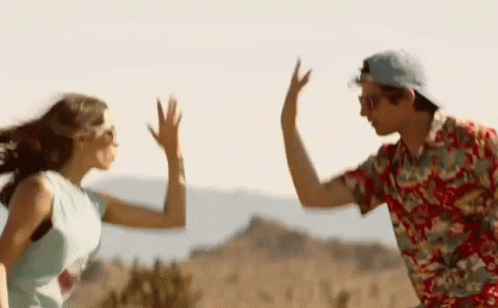
I'm used to writing a novel and everything builds to a climax. And with, there's a climax, it resets, there's a climax, it resets (laughs). So kind of figuring that out. But it's been a lot of fun. And just sort of flexing different horror muscles and I like to explore different tropes, but some tropes don't carry enough to hold a whole novel. I'm not writing an entire slasher novel. I'm writing like a mini slasher novel in a bigger novel. But it's a little too early for me to give too much away. But yeah, I can say that it's a time loop horror novel that takes place at a wedding.
MW: Before we get to the rapid-fire round, I want to talk about imposter syndrome. I wrote this question out whenever I was experiencing myself, like I do a lot of writing, and I filed a huge piece I've been working off for like two years today. And my partner's like, ‘How do you think it turned out?’ I'm like, ‘Probably pretty shitty,’ but I think once it's published, I'll feel better about it. Is that something that you deal with too, and if so, what do you kind of do to get yourself through that?
RH: I definitely experience it. I sort of like ping pong between complete imposter syndrome, like feeling like a talentless hack, and then feeling indignant that how come I'm not Stephen King? Like I kind of like ping pong back and forth. I don't have a happy medium. If someone tags me in like a negative review on Instagram, I'm like, ‘You hurt my feelings.’
I'm usually more like Eeyore. And then the rest of the time, I'm just in denial. So I think for imposter syndrome, the thing is no one's going to take you out of it. I think from when I first was writing a couple years ago, I was like, ‘Well, if I get an agent, that'll make me feel like a writer.’ ‘If I get a publishing deal, that'll make me feel like a writer.’ ‘All right, well, if my book sells, if I make a list, then I'll be …’ and none of those things make you make it go away. And I think making peace with the fact that if you love doing the thing, that has to be enough to sustain you. That joy is what you're after, not validation, because you're never going to get the validation that is going to make the imposter syndrome go away. Never, never, it's still going to be there.
You have to be your own fan and be your own cheerleader, because the external is never going to satisfy that. It's never going to appease it in any direction. If I get really strong or negative, what I feel like is unfair, negative feedback, then I get defensive, and that's not healthy either, because that's coming from a place of insecurity. So yeah, I think you just have to really focus on the joy of the thing that you're doing and know that it's healthy to feel that feeling and kind of let it pass and let the joy sustain you through the ebbs and flows because nothing, nothing is going to make it go away except you and your mindset. So, which, it sucks, you're just like, ‘Well, I wish there was like one external thing that would be like, you're cured,’ but it's a lifelong reflection.
MW: All right, and let's move on to the rapid fire.
RH: Bring it on.
MW: All right, so in ‘So Thirsty,’ there's a part where Sloane says, ‘You're up Hoss. I think I'm going to start calling people Hoss.’ So the people need to know, have you incorporated that into your daily life at all by calling random people Hoss?

RH: I thought that was going to be a bigger part of it. I was like, ‘Everyone's going to start calling people Hoss now.’ I brought it back and like, I didn't even do it. So no, I wish I did. (laughs)
I wish I did because it's so cool. But no, I couldn't make Hoss happen. Like with Mean Girls, like couldn't make Fetch happen. I couldn't make Hoss happen. Sloane's like, ‘Can I pull it off?’ And then I was like, ‘Eh, I feel like I can't pull it off.’
MW: My goal before the end of the year is just to call my boss, Hoss, one time.
RH: Let me know how it goes. I won't be held responsible if it doesn't go well.
MW: No, no, this is 100% on me, 100% of me and I don't think I can pull it off either, but damn, I'm going to try.
Sticking with ‘So Thirsty.’ Whenever they're younger, Naomi says, ‘Sloane, I have you figured out.’ She said you probably listened to The Strokes, The Yeah, Yeah, Yeahs, and Fiona Apple.
So how would you, Rachel, rank those artists one to three, just on your own personal preference?
RH: Probably Fiona Apple, The Strokes, and then The Yeah Yeah Yeahs. I love them all.

MW: When Fiona Apple released “Fetch the Bolt Cutters” at the beginning of the pandemic, it was just like the world needed this, Fiona. Thank you so much.
RH: Yes, please. We need you again more than ever.
MW: But so, you said it's been about a year now since you've read Nat Cassidy's new book. So, I'm curious, what's your favorite book that you've recently read?
RH: Oh, gosh. I'm trying to think. The first that comes to mind is called ‘House of Beth’ by Kerry Cullen. It's coming out in July.

It is sort of like a modern-day contemporary gothic, that feels sort of like ‘Rebecca’ in that it's a woman who is living in New York City working in publishing, really in love with her girlfriend, but she has pretty severe OCD, where she is struggling with intrusive thoughts. And it kind of causes her to blow up her life. And she moves back home to her New Jersey hometown and reconnects with a childhood friend whose wife recently passed under kind of mysterious circumstances. And it kind of unfolds from there. And it's not a horror book, I would say like, there's not like any big scares or jump scares or anything like that. It's just this kind of quiet dread. And that kind of persists throughout the novel, but it's also very beautiful and a really surprising and satisfying conclusion and just some of the most impressive prose that I've read recently. I have to shout that book out.
MW: You mentioned that they go back to New Jersey. So, I have to ask what makes New Jersey so damn cool to you?
RH: I don't know if it's cool, but I'm born and raised in New Jersey, and I left for like almost 20 years and I'm back now. I think it's just like this sort of scrappy attitude that people from New Jersey have, because we're just in the shadow of New York City, we kind of just feel like, but New York is kind of classy and we're kind of like not (laughs).
There are little pockets of New Jersey culture that we take a lot of pride in like, you know, The Sopranos and, you know, Jersey Shore. It's weird scrappy, like embracing what it is. I think it's just like a state of like angry drivers who are just kind of goofballs.
MW: That's been my experience as well as somebody not from New Jersey, a bunch of angry drivers.

RH: The worst. Do not drive in this state, it's a mess.
MW: You're somebody who does a lot of book tours, a lot of different conferences, and does a lot of media. What's the one question that you get asked the most often?
RH: Oh, that's interesting. I think usually I get asked a lot about feminist horror. And it's interesting because to me, I'm not consciously sitting down being like, ‘I'm going to write a feminist horror novel.’ Like I'm just like a woman who writes books about women who happen to be in their horror books. So, I get asked that question a lot.
And I think that's the one I clock the most because I'm just like, ‘Ask Stephen Graham Jones this question’ (laughs). Like the ‘Indian Lake’ series is feminist. I'm proud that my novels are considered feminist, but I think like, just ask me the questions that you would ask the dudes. I answer this question now because I'm particularly prickly about it at this time. So, you know, in a couple of months, I'd be like, ‘I write the feminist novels!’ (laughs) It depends on my mood. I apologize to everyone who asks me questions (laughs).
MW: I do want to ask you about one of your friends. So, your friend Tabitha made an appearance to promote the audio book of ‘Bad Dolls.’ I have to know, how's Tabby doing now?
RH: She's good. She's on her perch in the new apartment. She was a gift from a friend that I've had for a very long time. And I almost was like, I should send Tabby back because like, when we moved to this apartment, we decided to be minimalists.
So, we got rid of so much stuff. And I was like, I don't know how Tabby is going to look in the sparse apartment. Like we have nothing. And there's just like a doll (laughs). But Tabby and I had a long talk about it. And she wanted to stay. And Tabby is now a Jersey girl, and she's doing great.
MW: So, I have to know of your main characters, since you're a horror movie villain, which of them would make … I mean, no, YOU’RE NOT a horror movie villain. You're a horror movie fan. Look at that Freudian slip there. Now, which of your main characters would make the best horror movie villain?
RH: Hmm. Probably Vesper for spoiler-free reasons. I can't say why, but I think she would probably be the most villainy.
MW: Go read ‘Black Sheep’ and you will find out.
At the beginning, we mentioned the Kansas City Chiefs. I want to talk about their success. Is it real or is it a conspiracy?
RH: No, it's a conspiracy, but I lived in Western New York for the last five years. So, I'm a Buffalo Bills fan, I don't know.

There were the refs, and I think that they're a favorite. And I think that in all of their games, I'm just shocked about the calls that they can get away with and what their opponents get called on. So, but again, take it from where it comes. I'm a Bills fan.
MW: What's the first piece that you remember writing at any age
RH: I remember writing a children's book that was like an illustrated book. I'm sure it was for kids because I was a kid and like inspired by Who Framed Roger Rabbit? where somebody got squashed by a piece of heavy machinery because that's what happens in Who Framed Roger Rabbit?
So that is a very vivid memory of writing about a villain getting crushed to death by machinery, inspired by my watching that movie probably way too young.
MW: I think we found the 2027 book pitch that you need to send in. So if you get stuck, I'm just saying, I think you have something to turn to.
OK, You're on a plane ride. What are you listening to?
RH: Probably like ‘Talking Scared,’ ‘Books in the Freezer,’ or ‘She Wore Black’ podcast. I also really like the podcasts ‘Noble Blood,’ ‘Radio Rental,’ and then ‘This Actually Happened,’ in which people tell stories about crazy things that have actually happened to them.
I was on a plane listening to that podcast and there was an episode about a man who went skydiving and his parachute didn't open. And I was like, ‘I probably shouldn't be listening to this on a plane.’
MW: Yeah, that's where Fiona Apple might come in handy to kind of switch it over to the music playlist at that moment in time.
And the last thing, what makes horror so special to you?
RH: It's a place where I have permission to feel all my big feelings and the ugly feelings and the monstrous feelings and to kind of let my monsters run amok and then go about my life feeling settled and prepared for whatever horrors may be.
MW: I love that answer a lot.
Rachel, thank you so much for joining me.
I know we're all looking forward to checking out ‘Play Nice.’ Where can people find you on social media, and where can people pre-order the book?
RH: So, on social media, I'm on Instagram @rachelharrisonsghost. And then you can pre-order the book at Barnes and Noble, rachel-harrison.com, or penguinrandomhouse.com. And I'm also doing signed pre-orders through Word Bookstore in Jersey City and through Little City Books in Hoboken, New Jersey. So yeah, anywhere books are sold or you could request it at your local library, that would be awesome, too.
MW: Thanks again Rachel for joining the Walking Bucket. I love you awesome nerds. We'll see you next time.
